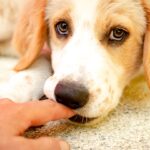Why Do Dogs Growl In Their Sleep
Dogs are known for their loyalty and companionship, but sometimes they can be a bit mysterious. One of the most perplexing behaviors that dogs exhibit is growling in their sleep. While it may seem alarming to hear your furry friend making aggressive noises while they snooze, there’s actually a lot more going on than meets the eye.
So why do dogs growl in their sleep? Let’s explore some of the possible reasons behind this curious behavior.
1. Dreaming
One of the most common explanations for why dogs growl in their sleep is that they’re simply dreaming. Just like humans, dogs have active brains during sleep, and they often experience vivid dreams.
When a dog growls or moves around in their sleep, it’s possible that they’re reacting to something that’s happening in their dream. Maybe they’re chasing after a squirrel or defending their territory from an imaginary intruder.
It’s important to note that these dream-induced growls are not indicative of any aggression or hostility towards their owners. In fact, many dogs who growl in their sleep are some of the sweetest and most affectionate pets you’ll ever meet.
2. Physical Discomfort
Another possible reason that dogs might growl in their sleep is that they’re experiencing physical discomfort. This could be anything from a sore muscle to an upset stomach.
If your dog tends to growl more frequently while they’re sleeping, it might be worth taking them to the vet for a checkup. They could be experiencing an underlying health issue that needs attention.
3. Stress or Anxiety
Dogs who experience stress or anxiety during waking hours may also exhibit these emotions in their sleep. If your dog is prone to anxious behaviors like pacing or panting, it’s possible that they’ll also growl while they’re asleep.
In these cases, it’s important to address the root cause of your dog’s stress and work with them to develop coping mechanisms. This could involve training exercises, behavior modification techniques, or even medication in extreme cases.
4. Protective Instincts
Finally, some dogs may growl in their sleep as a result of their natural protective instincts. Even while they’re snoozing, dogs are attuned to the world around them and may react defensively if they perceive a threat.
This is especially true for dogs who are particularly protective of their owners or territory. If your dog is growling in their sleep, it could be a sign that they’re feeling extra vigilant and on-guard.
Conclusion
While it can be unsettling to hear your dog growling in their sleep, there’s usually no cause for concern. In most cases, this behavior is harmless and simply a reflection of the complex inner lives of our furry friends.
If you’re ever worried about your dog’s sleeping habits or behavior, don’t hesitate to reach out to a professional trainer or veterinarian for guidance. With a little patience and understanding, you can help your dog rest easy and enjoy sweet dreams free from growls and other nighttime disturbances.



